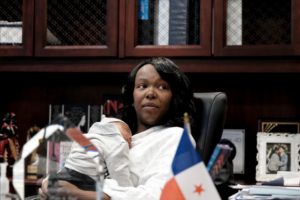A Pregnant Lawmaker Couldn’t Vote Remotely. So, She Changed the Law

Originally published by Lateshia Beachum for the Washington Post
The bill co-sponsored by the Prince George’s lawmaker this fall was straightforward: a procedural change that would allow County Council members to vote virtually if they are experiencing illness, parental leave or “a significant or unexpected factor or event” outside their control.
Krystal Oriadha (D), who represents District 7, was eight months into her first pregnancy. The county’s health insurance plan didn’t cover birthing care in the county. And as a Black woman over 35, her pregnancy was considered high-risk. During meetings at county headquarters, she would munch on ice and pickles to quell her nausea, her swollen feet shoved into the neon sneakers that still fit.
But Oriadha, now 37, wanted to continue attending meetings, even if she couldn’t do so in person. Her fellow council members wouldn’t object, she thought, since the world had gotten used to conducting business over computers and smartphonesduring the pandemic. Plus, pregnancy and health-related reasons seemed sensible.
She was wrong.
Council member Calvin S. Hawkins II (D-At Large) accused her of “making yourself the victim.” The council rejected Oriadha’s request, drawing protests far beyond the county and grabbing the attention of prominent female politicians in the region. Weeks later, council members reversed themselves.
Now, as she launches into a new term on the council that she helped reshape, the outspoken liberal — who became the first council member to give birth while in office — is focused on ensuring other pregnant people don’t experience the rough path she had.
She gave birth to a boy, Ezra, in October, and quickly logged into a council meeting the following morning to be able to vote on bills she had introduced, concerned her proposals would die without her presence.
She had always been able to fight for other people, she said. But, she noted, “the fight for the legislation for virtual vote was really the first time a piece of legislation was so directly connected to me and I felt like I was advocating for myself.”